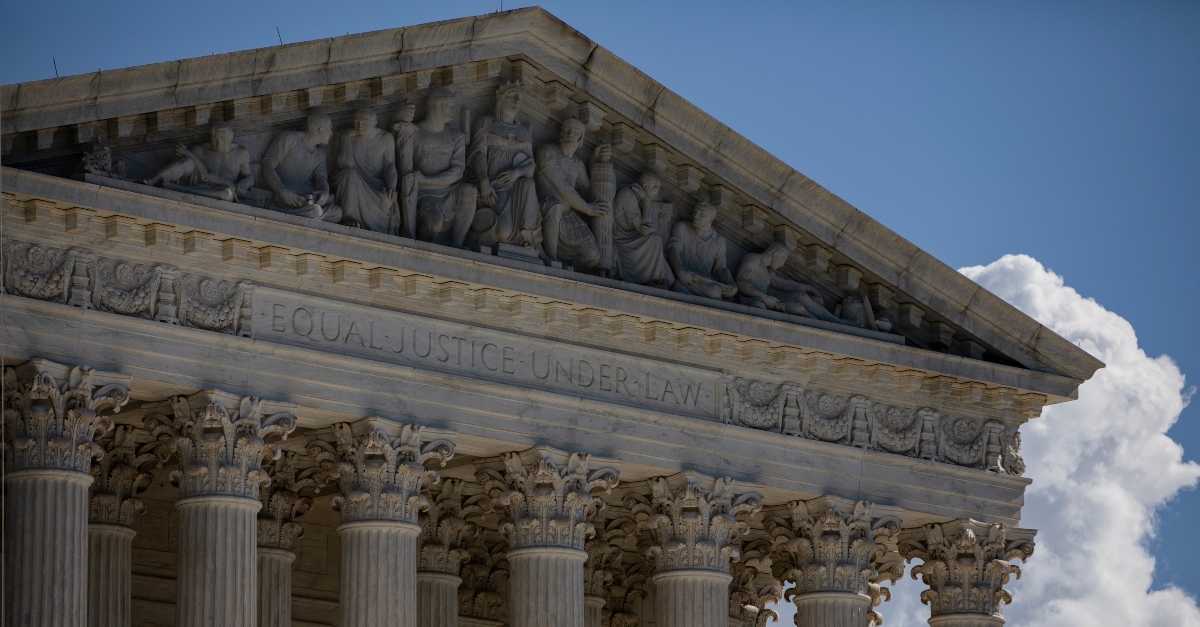
The U.S. Supreme Court on Thursday ruled the U.S. military can prosecute sexual assault offenses committed between 1986 and 2006 under the Uniform Code of Military Justice (UCMJ) because no statute of limitations applies to rapes committed during that time.
Writing for a unanimous court, Justice Samuel Alito’s opinion reverses three prior rulings issued by the U.S. Court of Appeals for the Armed Forces (CAAF) which held that the five-year statute of limitations for prosecuting former service members Michael Briggs, Richard Collins and Humphrey Daniels III had lapsed by the time their prosecutions commenced–setting aside their convictions.
The first two men raped fellow service members. The third man raped a civilian. Each of the three men were convicted of rape by court-martial but had their convictions overturned on appeal.
The issue before the court in the three consolidated cases was how a provision of the UCMJ interacts with Supreme Court precedents that prohibit the death penalty for crimes that don’t result in deaths.
Alito explains the particulars [emphasis in original]:
During the period at issue, Article 120(a) of the UCMJ provided that rape could be “punished by death,” and Article 43(a), which was amended in 1986, provided that an offense “punishable by death” could be tried and punished “at any time without limitation.” The crux of the question before us is the meaning of the phrase “punishable by death” in the latter provision. Respondents contend—and the CAAF held—that the phrase means capable of punishment by death when all applicable law is taken into account.
According to the former service members convicted of rape, the Eighth Amendment’s prohibition against cruel and unusual punishment means the UCMJ cannot sustain the death penalty for rape. Therefore, they argued, the UCMJ’s default five-year statute of limitations should have barred their original prosecutions because they were not prosecuted within five years.
The government, on the other hand, argued that Congress exempted all military crimes punishable by death from being subject to statutes of limitations. Therefore, the government argued, there is no statute of limitations for rapes committed by members of the military.
Relevant to the high court’s inquiry are two Supreme Court cases which previously limited the application of the death penalty: the landmark 1977 decision in Coker v. Georgia and the 2008 decision in Kennedy v. Louisiana.
Alito sums up the arguments [emphasis in original]:
Because this court held in Coker v. Georgia, that the Eighth Amendment forbids a death sentence for the rape of an adult woman, respondents argue that they could not, in fact, have been sentenced to death, and therefore the statute of limitations for their crimes (committed in 1998, 2000, and 2005) was the 5-year statute that generally governed non-capital offenses. By contrast, the government argues that Article 43(a)’s reference to “punishable by death” means capable of punishment by death under the penalty provisions of the UCMJ, and since Article 120(a) provided (despite Coker) that rape could be punished by death, it follows that there was no time limit for filing rape charges against respondents.
“On balance, we find the government’s interpretation more persuasive,” the court determined. “The meaning of a statement often turns on the context in which it is made, and that is no less true of statutory language. And in these cases, context is determinative. The phrase ‘punishable by death’ appears in a statute of limitations provision for prosecutions under the UCMJ.”
Alito goes on to note that “context weighs heavily in favor of the government” here because the rest of the UCMJ, when read together, supports such a conclusion. The justice explains: “[UCMJ] Article 120’s directive that rape could be ‘punished by death’ is the most natural place to look for Congress’s answer to whether rape was ‘punishable by death’ within the meaning of Article 43(a).”
The court also notes that interests of “clarity” support the government’s position.
“Other things being equal, certainty in statutes of limitations generally serves the interests of all concerned, and that is certainly true with respect to the statute of limitations for rape,” the opinion explains. “For prosecutors handling such cases, it is obviously helpful to know the deadline by which charges must be filed. For persons who know they may be under investigation, a known statute of limitations provides a date after which they may no longer fear arrest and trial. And for rape victims, who often wrestle with the painful decision whether to identify their attackers and press charges, a clear deadline allows them to know by when they must make that choice.”
The former service members’ argument, however, would result in the opposite of clarity for the question presented here–because taking all applicable law into account and applying it to the UCMJ is not a foregone conclusion since Congress has previously determined that military justice is not the same as civilian justice.
Again the decision at length:
If “punishable by death” in Article 43(a) means punishable by death under the penalty provisions of the UCMJ, the rule regarding the latest possible date for commencing a rape prosecution is clear: The prosecution may be brought “at any time without limitation.” By contrast, if “punishable by death” meant punishable by death after all applicable law is taken into account, the deadline for filing rape charges would be unclear. The deadline would depend on the answer to an unresolved constitutional question about which the parties in these cases vigorously disagree.
[image via Samuel Corum/Getty Images]